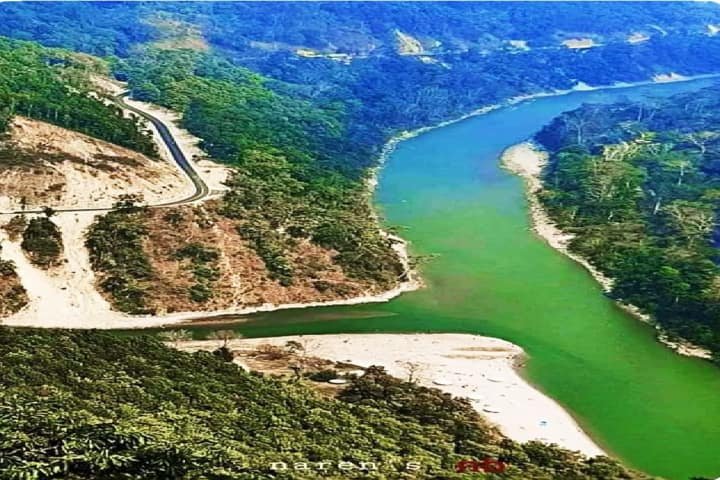The Teesta River, originating from the eastern Himalayas, flows through the Indian states of Sikkim and West Bengal before entering Bangladesh, where it eventually merges with the Brahmaputra River. Spanning approximately 414 kilometres, the river is vital for both India and Bangladesh, supporting agriculture, livelihoods, and ecosystems.
In addition, India and Bangladesh share a 4096 km long porous border and 54 rivers’ waters. The river’s waters are crucial for irrigation in the arid regions of northern West Bengal and northwestern Bangladesh, making it a lifeline for millions of people. Given the river’s significance, water-sharing between India and Bangladesh has been a critical aspect of their bilateral relations.
Water diplomacy involves negotiating and managing shared water resources to ensure equitable and sustainable use, addressing both countries’ needs and interests. Effective water diplomacy is essential to prevent conflicts, promote regional stability, and ensure the sustainable management of transboundary water resources.
The Teesta River water-sharing issue has a long history, rooted in the complexities of colonial and post-colonial geopolitics. The river’s significance for both India and Bangladesh has made its water allocation a contentious topic since the partition of India in 1947.
The Indo-Bangladesh Treaty of Friendship, Cooperation, and Peace in 1972 laid the groundwork for cooperation, but it was not until the 1983 ad-hoc agreement that a temporary water-sharing arrangement was established.
India and Bangladesh share a 4096 km long porous border and 54 rivers’ waters. The river’s waters are crucial for irrigation in the arid regions of northern West Bengal and northwestern Bangladesh
Several attempts have been made to reach a comprehensive agreement on the Teesta River’s water-sharing. Notably, the 2011 draft agreement proposed a 50:50 water-sharing ratio during the lean season, which was welcomed by Bangladesh but faced opposition from the Indian state of West Bengal. Despite various high-level meetings and negotiations, a permanent agreement is yet to be finalised, reflecting the complexities of domestic and bilateral politics.
Political dynamics within India, particularly the influence of regional politics in West Bengal, have significantly impacted the negotiations. Environmental factors, such as climate change and variability in river flows, further complicate the issue. Both countries face increasing water stress due to growing populations and agricultural demands, making the need for a sustainable and equitable solution more urgent.
The Teesta River Project encompasses various initiatives aimed at managing and utilising the river’s resources effectively. These include dam construction, irrigation schemes, and hydroelectric projects designed to harness the river’s potential for economic development and energy production.
Goals and objectives: The primary goals are to enhance water storage, improve irrigation efficiency, and generate hydroelectric power, benefiting both countries.
The Teesta River water-sharing issue has a long history, rooted in the complexities of colonial and post-colonial geopolitics. The river’s significance for both India and Bangladesh has made its water allocation a contentious topic since the partition of India in 1947
Key stakeholders involved: Governments of India and Bangladesh, regional authorities in West Bengal and Bangladesh’s northern districts, local communities, and international organisations.
Technical aspects of the project: Construction of dams and reservoirs, canal networks for irrigation, and hydroelectric power plants. Environmental impact assessments and sustainable management practices are integral to the project’s design.
In recent years, several rounds of negotiations have taken place to resolve the Teesta River water-sharing dispute. High-level meetings between Indian and Bangladeshi officials have aimed to reach a mutually acceptable solution.
Notably, during Indian PM Narendra Modi’s visit to Bangladesh in 2021, both countries reiterated their commitment to resolving the issue amicably. However, significant progress remains elusive, primarily due to internal political dynamics within India. Both countries are also set to collaborate on a significant $1 billion project aimed at the comprehensive management and restoration of the Teesta River.

Bangladesh Prime Minister Sheikh Hasina has expressed a preference for India to undertake this project over China, despite both countries showing interest and conducting feasibility studies. The project involves managing the river’s water flow better, which has been a contentious issue between the two nations. The development includes flood control, water management, and land reclamation efforts along the Teesta River, which flows from India into Bangladesh.
Bangladesh’s PM Hasina highlighted the long-standing water-sharing issues with India and believes that India’s involvement in this project could lead to a more effective resolution of these problems. This move also aligns with Bangladesh’s broader strategy to balance its diplomatic and economic engagements between India and China.
Several attempts have been made to reach a comprehensive agreement on the Teesta River’s water-sharing. Notably, the 2011 draft agreement proposed a 50:50 water-sharing ratio during the lean season, which was welcomed by Bangladesh but faced opposition from the Indian state of West Bengal
The project’s scope includes constructing embankments, improving irrigation systems, and enhancing the overall ecological health of the river basin, which will benefit both countries significantly in terms of agriculture, water security, and regional cooperation.
However, Bangladesh demands a fair share of the river’s waters during the dry season, crucial for its agricultural activities. India, particularly the state of West Bengal, argues that its own water needs must be met first.
There are concerns about the environmental impact of proposed projects, including potential disruptions to ecosystems and livelihoods dependent on the river. In India, regional politics, especially in West Bengal, play a significant role in shaping the national stance on the issue, complicating bilateral negotiations.
Regional organisations like the South Asian Association for Regional Cooperation (SAARC) and international bodies such as the United Nations have the potential to facilitate dialogue and mediate negotiations. While their involvement has been limited, their expertise in water resource management and conflict resolution could provide valuable support in bridging the gap between India and Bangladesh.
Some success stories from the Indus Waters Treaty (IWT) between India and Pakistan serves as a notable example of a successful international water-sharing agreement, demonstrating the potential for cooperation, despite political tensions
Although, the political landscape in both countries, influenced by regional interests and national priorities, often hampers the negotiation process. Sustainable management of the Teesta River requires addressing environmental issues such as river flow variability, sedimentation, and the impact of climate change. Economic differences between the two countries can create imbalances in negotiating power, complicating efforts to reach an equitable agreement.
There are other future collaborative projects focusing on sustainable water management, such as joint hydroelectric power plants or irrigation schemes, which could provide mutual benefits and build trust between the two nations. Strengthening regional cooperation through platforms like SAARC will facilitate dialogue and promote integrated water resource management in South Asia.
Some success stories from the Indus Waters Treaty (IWT) between India and Pakistan serves as a notable example of a successful international water-sharing agreement, demonstrating the potential for cooperation, despite political tensions. Effective dispute resolution mechanisms, third-party mediation, and adherence to international water law principles can contribute to successful water-sharing agreements.
The policymakers should prioritise cooperation over competition, focusing on joint projects and sustainable water management practices. Open communications and transparency in negotiations can build trust and facilitate progress. Seeking the assistance of international organisations and experts in water resource management can provide valuable guidance and support.
The future of India-Bangladesh water diplomacy on the Teesta River hinges on the willingness of both nations to engage in constructive dialogue, prioritise mutual benefits, and adopt sustainable water management practices
Engaging local communities in decision-making processes can ensure that their needs and concerns are addressed. Civil society organisations can play a crucial role in raising awareness about the importance of sustainable water management and advocating for equitable water-sharing agreements. Promoting research and data-sharing on the Teesta River’s hydrology and environmental impact can inform better decision-making.
The Teesta River water-sharing issue remains a complex and multifaceted challenge requiring careful management and sustained cooperation between India and Bangladesh. Historical tensions, political dynamics, and environmental concerns add layers of complexity to the negotiations.
Despite the challenges, continued dialogue and cooperation are essential for achieving a fair and sustainable solution. Both countries stand to benefit significantly from a mutually acceptable water-sharing agreement that promotes regional stability and sustainable development.
The future of India-Bangladesh water diplomacy on the Teesta River hinges on the willingness of both nations to engage in constructive dialogue, prioritise mutual benefits, and adopt sustainable water management practices.
By leveraging regional cooperation frameworks and international support, India and Bangladesh can pave the way for a brighter and more prosperous future for their shared water resources.
The writer is Special Advisor for South Asia, Parley Policy Initiative, Republic of Korea. He is a regular commentator on water security and transboundary river issues in South Asia. He tweets on X, @The_China_Chap. The views expressed are those of the writer and do not necessarily reflect the views of Raksha Anirveda
–The writer is a Special Advisor for South Asia at the Parley Policy Initiative, Republic of Korea. He regularly provides commentary on India-China border issues, water security, and transboundary river challenges in South Asia. You can follow his updates on X at @The_China_Chap. The views expressed are of the writer and do not necessarily reflect the views of Raksha Anirveda









